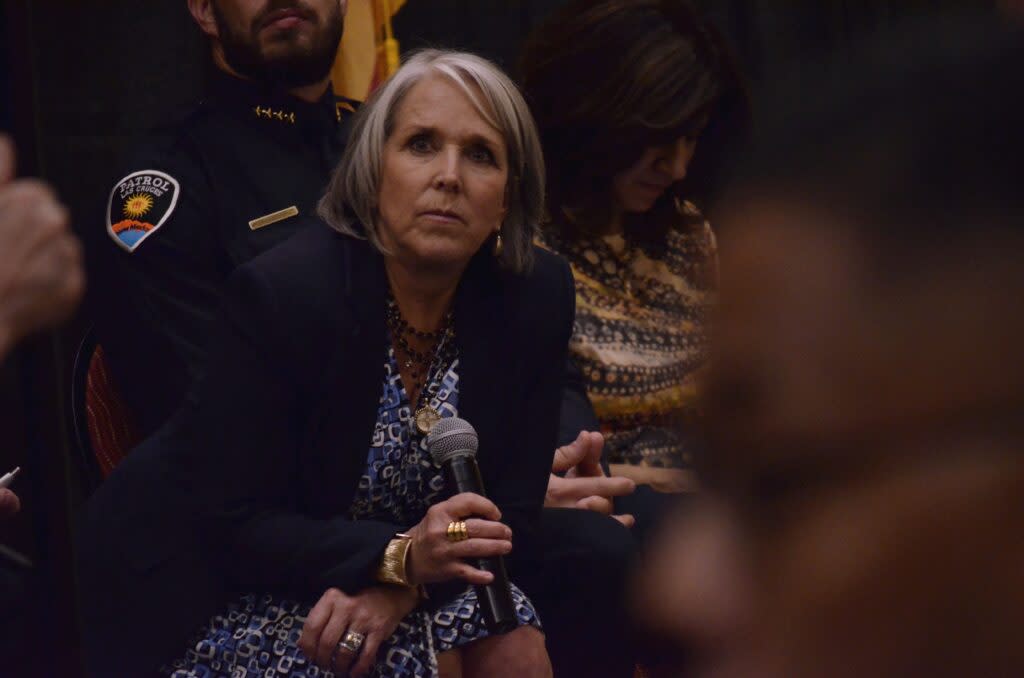NM governor says special session ‘was not fair,’ but she won’t punish wildfire survivors for it

- Oops!Something went wrong.Please try again later.
Gov. Michelle Lujan Grisham listens during a town hall she hosted in Las Cruces about public safety. (Photo by Danielle Prokop / Source NM)
More than a week after a contentious special legislative session, New Mexico’s governor still has not signed the single piece of legislation lawmakers sent to her desk.
As part of a wide ranging five-hour-long town hall meeting in Las Cruces on Thursday night, Gov. Michelle Lujan Grisham talked about House Bill 1, the only proposal lawmakers voted to pass on July 18.
Jodi McGinnis Porter, a spokesperson for the governor, said Friday that Lujan Grisham and her staff are “still reviewing the bill.”
The legislation, called the “feed bill,” asks the governor to spend $211,900 for the special session itself, along with $100 million in relief for survivors of the South Fork and Salt fires in southeastern New Mexico.
If signed, it would also give $3 million to the New Mexico Administrative Office of the Courts to pay for assisted outpatient treatment and competency diversion pilot programs.
While the governor is seeking reforms to the laws governing these kinds of behavioral health programs, the bill would leave the law untouched and simply fund existing programs or those that are already legal.
After the Legislature adjourned on July 18, Senate Majority Leader Peter Wirth (D-Santa Fe) asked the governor not to use her line-item veto power to remove the pilot project money.
Lujan Grisham said Thursday the legislation “gives me pause,” and the existing treatment programs the bill would fund “are not evidence-based.” However, she conceded “we do have to invest money in the kind of health care infrastructure that we should have.”
“I didn’t ask for all that money in the special; I wasn’t going to ask for all that money in the special,” Lujan Grisham said at the town hall in Las Cruces. “I wanted six or seven public safety bills, and I did encourage them to spend money in Lincoln County, and I don’t regret that at all.”
Lincoln County residents, along with people from nearby Otero County and Mescalero Apache, are still facing issues with the aftermath of the fires that burned thousands of homes. Rain calmed the fires, but flooding followed. Recovery is still ongoing.
“Punishing people in Lincoln County for the failure to address public safety doesn’t seem to me to be the design that I am all that interested in, but I haven’t signed the bill yet,” Lujan Grisham said.
She said there’s “other stuff” in the bill “I need to take a look at.”
An audience member in Las Cruces asked why Lujan Grisham didn’t delay the special session once it became clear Democrats in both chambers were united in opposition to her bills. She responded by saying lawmakers “promised a fair process, and I will tell you: it was not fair.”
“I’m not a stranger to how the Legislature works, and I don’t appreciate that any body of government doesn’t play fair,” she said.
Lujan Grisham said she has been asked to call a special session on public safety “almost every year since I’ve been governor.”
“I rejected that, to try to figure it out, and now it is clear to me that I need the public more involved because what the Legislature basically said to me is that, ‘Nobody wants us to deal with this issue,’ and that they didn’t have time,” she said. “I reject that. They had lots of time.”

